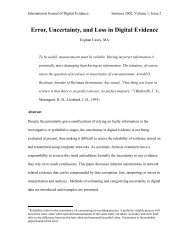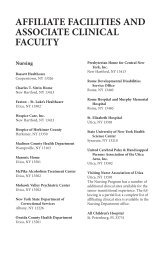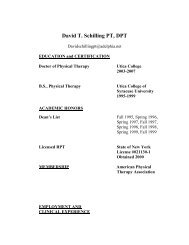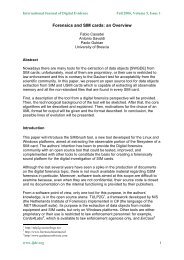Download PDF version - Utica College
Download PDF version - Utica College
Download PDF version - Utica College
You also want an ePaper? Increase the reach of your titles
YUMPU automatically turns print PDFs into web optimized ePapers that Google loves.
Tradition. Opportunity. Transformation.®<br />
Kate<br />
COmmIttED ACtIVISt AND HONOrED FACUltY SPOUSE<br />
KAtE OSEr AlwAYS wENt wHErE HElP wAS NEEDED<br />
To label her merely as a liberal would be to demean the breadth and depth of her<br />
compassion for the human condition. Her passion for the righteousness of simple<br />
human dignity transcended politics. While on their face, her ideals and values<br />
clearly coincided with the left on the political spectrum, her passion for all humans<br />
precluded her from advocating for any cause simply for political gain. That’s not to<br />
say Kate Oser, who passed away on September 8, 2009 at the age of 91, didn’t involve<br />
in the occasional political donnybrook, but the intersection of her humanism with the political<br />
orbits of particular parties was clearly a matter of happenstance.<br />
Oser, wife of the late Jacob Oser, professor emeritus of economics, began her life of activism in<br />
the mid-1930s when she joined other Boston-area college students at a rally protesting fascist leader<br />
Benito Mussolini’s invasion of Ethiopia. “I think it was the first rally I went to,” Oser said in late<br />
August at the <strong>Utica</strong>-area assisted living facility where she had been residing for the past year. “I was<br />
really self-conscious because I had never been to a rally before and any new thing you get a little<br />
jittery about, but it was the right thing to do. And there I was,” she added with a little laugh.<br />
While slowed by age and physically hampered by a stroke she suffered in 2006, Oser still recalled<br />
in wistful tones the part she played at particular stops along the path of history. She arrived in the<br />
<strong>Utica</strong> area in the early 1950s when Jake accepted a position at the <strong>College</strong>, and wasted little time<br />
in getting involved in the community. In Clinton, where she and Jake settled, there was a sizable<br />
migrant farm worker population, and these seasonal workers from the South, most of whom were<br />
African-American, endured poor working conditions and meager pay. Added to that was the overt<br />
and covert racism of the day. Oser, naturally, set about to help.<br />
“They were very hard-working people and I don’t think people appreciated the work they were<br />
doing. Their life wasn’t easy,” Oser recalled. “They were given a chit every time they filled a bushel<br />
of peas or beans. They only got 30 cents a bushel. It takes an awful lot of peas to fill a bushel basket.”<br />
Oser enrolled the workers in Federal assistance programs. “We were trying to bring these<br />
programs to the people; they could get free butter, milk and cheese and I even think they got cereal.<br />
This would help them get through when they had very little cash. It was very valuable to them.”<br />
She would take the women to area clinics for exams and help with birth control. Child care,<br />
summer schools, evening adult education, and even inter-camp baseball games were also started<br />
by Oser and the many other volunteers.<br />
Often, Oser was viewed with disdain by some of her neighbors. She remembered one woman was<br />
absolutely horrified when Oser told her she was going to visit the camps. “People were mystified.<br />
One woman gave a screech of horror and exclaimed, ‘You’re going to a camp where there are black<br />
men?’ She couldn’t believe it,” Oser recalled, chuckling at the memory.<br />
pioneer 17 fall 2009










